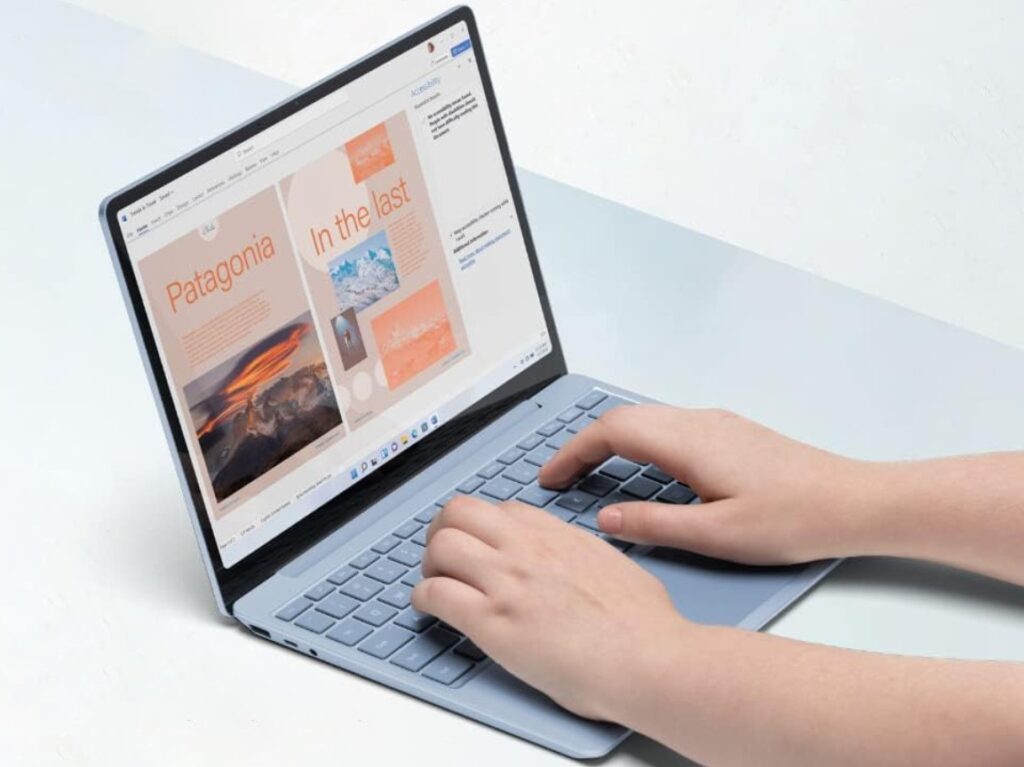Dementia, a group of conditions affecting memory and thinking skills, can present challenges when using technology. But there’s good news! Dementia-Friendly Tech, like easy-to-use laptops with large screen displays and simple interface layouts, can be powerful tools for enhancing the lives of dementia patients. These laptops offer a window to connect with loved ones via video calls, engage in stimulating activities like memory games, and provide a source of entertainment.
However, choosing the right laptop requires careful consideration. Factors like Windows vs Chromebook operating systems, the potential benefits of touchscreen laptops for dementia, or including laptops with high contrast displays for better visibility, all come into play.
In this guide, we’ll explore the benefits of laptops for dementia patients (Best Tech for Dementia Patients), navigate key features for user-friendly navigation, and help you select the perfect device to keep your loved ones connected and engaged (Communication Aids for Dementia).
Understanding Dementia Patients’ Needs
Before diving into the perfect dementia-friendly laptop, let’s take a step back and understand the unique needs of dementia patients. Dementia, encompassing conditions like Alzheimer’s, affects memory, thinking, and reasoning abilities. This can create significant challenges when interacting with technology.
Here’s a closer look at some common hurdles dementia patients face:
- Memory Loss: Remembering login information, navigating unfamiliar programs, and following complex instructions can be difficult.
- Dexterity Issues: Fine motor skills may decline, making it hard to use a small touchpad or type accurately.
- Vision Problems: Difficulty seeing small text or distinguishing colors can create frustration.
- Cognitive Decline: Processing information and adapting to new interfaces can be challenging.
By understanding these obstacles, we can choose features that enhance usability and create a positive experience for dementia patients.
Key Features for Dementia-Friendly Laptops
Now that we understand the challenges faced by dementia patients, let’s explore the key features that make a laptop truly dementia-friendly:
- Simple Interface: Think clean and uncluttered! Large, clearly labeled icons and easy-to-read text are crucial. Imagine a calming, uncrowded desktop that’s easy to navigate.
- Accessibility Features: Built-in features are your friends! Look for options like magnified screens, increased font size options, and high-contrast themes to enhance visibility.
- Touchscreens (Considered): Touchscreens can offer an intuitive way to interact, but accidental touches can be an issue. Consider a balance between ease of use and potential for mistakes.
- Durability: Let’s face it, accidents happen. A sturdy build quality can withstand bumps and drops, offering peace of mind for caregivers.
- Security: Safety first! Pre-installed security software and parental controls ensure a safe online environment for dementia patients.
These features, combined with the right operating system, screen size, and battery life (we’ll explore those next!), will create a user-friendly experience that empowers dementia patients to connect, explore, and enjoy the benefits of technology.
Top Considerations When Choosing a Laptop
We’ve explored the features that make a laptop dementia-friendly, but with so many options on the market, how do you choose the perfect one? Here are the key factors to consider:
- Operating System: Windows offers familiarity for many users, while Chromebooks boast simplicity and security. We’ll delve deeper into the pros and cons of each system to help you decide.
- Screen Size: Balancing usability and portability is key. Larger screens provide better visibility for those with vision issues, but a lighter weight might be ideal for lap use.
- Battery Life: Long battery life ensures uninterrupted use, whether it’s a video call with loved ones or enjoying a favorite movie.
- Technical Support: Readily available technical support can be a lifesaver for caregivers who may need assistance setting up the laptop or troubleshooting minor issues.
By carefully considering these factors alongside the dementia-friendly features discussed earlier, you can confidently choose a laptop that empowers your loved one and fosters connection and enjoyment.
Best Laptop Options for Dementia Patients
Acer Chromebook Spin 311

- Processor: Typically Intel Celeron N4020
- RAM: 4GB LPDDR4
- Storage: 32GB eMMC (limited), some variants offer 64GB
- Display: 11.6″ HD (1366 x 768) touchscreen
- Battery: Up to 10 hours (claimed)
- Operating System: ChromeOS
- Weight: 1.05kg (very lightweight)
The Acer Chromebook Spin 311 is a great option for someone with dementia who needs a simple and user-friendly laptop to stay connected and entertained. Its ChromeOS interface is clean, uncluttered, and has large icons that are easy to understand.
The touchscreen is a game-changer, making it much easier to navigate than a touchpad or mouse, especially for someone with limited dexterity. The laptop is incredibly lightweight, making it easy to carry around the house. It also has a long battery life, easily lasting a full day on a single charge.
Setting it up is a breeze, and ChromeOS updates automatically, so there’s nothing complicated to deal with there. The laptop works well for basic browsing and video calls, but it’s not ideal for complex tasks. It can get a little sluggish at times, especially when switching between multiple apps.
The 32GB storage fills up fast, especially with videos. If you want to store some of your favourite movies and music offline, you may want to upgrade to the 64GB version.
Overall, the Acer Chromebook Spin 311 is a great laptop for someone with dementia. The long battery life, lightweight design, and touchscreen display are all big pluses. Just keep in mind the storage limitations and manage your expectations for performance.
Pros
- Highly Portable
- Long Battery Life
- User-Friendly ChromeOS
- Touchscreen Display
- Affordable
Cons
- Limited Storage
- Underpowered Performance
- Lower Resolution Display
Samsung Galaxy Chromebook 4

- Processor: Usually Intel Celeron N4000 (can vary depending on model)
- RAM: 4GB LPDDR4
- Storage: 32GB eMMC (limited), some variants offer 64GB
- Display: 11.6″ HD (1366 x 768) LED
- Battery: Up to 10 hours (claimed)
- Operating System: ChromeOS
- Weight: 1.1kg (lightweight)
If you’re looking for a laptop for a loved one with dementia, the Samsung Galaxy Chromebook 4 might be a good option to consider. With its sleek design and positive reviews, this Chromebook offers a simple and user-friendly interface that can be helpful for someone with dementia. The ChromeOS is clean and uncluttered, with large icons that are easy to understand and navigate.
If you’re looking for a laptop for a loved one with dementia, the Samsung Galaxy Chromebook 4 might be a good option to consider. With its sleek design and positive reviews, this Chromebook offers a simple and user-friendly interface that can be helpful for someone with dementia. The ChromeOS is clean and uncluttered, with large icons that are easy to understand and navigate.
However, it’s worth noting that the 32GB storage fills up fast, especially with videos, so upgrading to the 64GB version might be necessary.
Another limitation is the lack of a touchscreen, which might be even easier for someone with limited dexterity. Lastly, the performance can get a little sluggish at times, especially when switching between multiple apps.
Overall, if you manage expectations for performance and upgrade the storage, the Samsung Galaxy Chromebook 4 can be a great option to consider for a loved one with dementia.
Pros
- Stylish Design
- Solid Build Quality
- High-Resolution Display
- Long Battery Life
- ChromeOS Perks
Cons
- Limited Storage
- Underpowered Performance
- No Touchscreen
Microsoft Surface Laptop Go 2

- Processor: 11th Gen Intel Core i5 Processor (varies by model)
- RAM: 4GB or 8GB LPDDR4x
- Storage: 128GB or 256GB SSD
- Display: 12.4″ PixelSense™ touchscreen display (1536 x 1024 resolution)
- Battery: Up to 13.5 hours (claimed)
- Operating System: Windows 11 Home (upgradeable to Pro)
- Weight: 1.12kg (very lightweight)
The Microsoft Surface Laptop Go 2 is a laptop that may seem like a great option for those looking for a portable, user-friendly device for their loved ones with dementia. Its sleek design, vibrant touchscreen, and long battery life are some of its advantages.
However, after using it for some time, there are some considerations to keep in mind. While the familiarity of Windows may be a benefit for some, the complexity of Windows 11 can be overwhelming, especially for dementia patients.
Additionally, the limited storage capacity and performance limitations may also be a concern. Therefore, while the Surface Laptop Go 2 is a well-built and portable device, a simpler and more user-friendly option like a Chromebook with ChromeOS might be a better choice for dementia patients.
If you do choose the Surface Laptop Go 2, be prepared to spend some time customizing Windows 11 for a simplified experience and consider upgrading the storage to avoid running out of space quickly.
Pros
- Ultra-Portable
- Premium Design
- Vibrant Touchscreen
- Surprisingly Capable
- Long Battery Life
Cons
- Limited Storage
- Single USB-C Port:
- No Thunderbolt Support
Conclusion
Dementia presents challenges, but technology can bridge the gap. Dementia-friendly laptops, with the right features, empower connection, entertainment, and cognitive stimulation.
This guide equips you to:
- Understand patient needs.
- Identify key user-friendly features.
- Consider factors like operating system and screen size.
- Explore diverse laptop options.
Remember, personalization is key. Choose a laptop that aligns with your loved one’s needs and preferences. Further research can help you discover the perfect tool to empower them and unlock the possibilities of technology.

